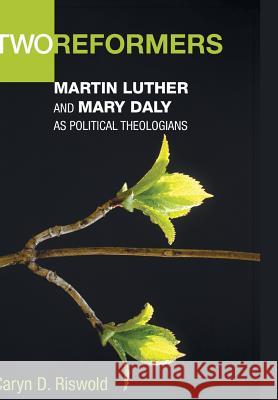Two Reformers » książka
Two Reformers
ISBN-13: 9781498210393 / Angielski / Twarda / 2007 / 216 str.
Two Reformers
ISBN-13: 9781498210393 / Angielski / Twarda / 2007 / 216 str.
(netto: 166,52 VAT: 5%)
Najniższa cena z 30 dni: 174,36
ok. 16-18 dni roboczych
Dostawa w 2026 r.
Darmowa dostawa!
Description: "By them we have been carried away out of our own land, as into a Babylonian captivity, and despoiled of all our precious possessions." Martin Luther, 1520 "Their goal is our deracination, which is 'detachment from one's background (as from homeland, customs, traditions).' Thus women and other Elemental creatures on this planet are rendered homeless, cut off from knowledge of our Race's customs and traditions." Mary Daly, 1984 What is this land, this world of which these two theologians are speaking? Why do the two statements above sound similar in the authors' longing for a true home, for our own land? And who is this "them" who carries us away and cuts us off? Could it be possible that Martin Luther and Mary Daly, different in almost every way, are saying something similar? Why do these key figures in the Christian theological tradition, who come from different times, places, and politics, engage in such a parallel task? How is this possible? This book examines a series of surprising parallels between two key reforming figures in the Christian theological tradition and suggests that the two are in fact engaged in the same task: political theology. Applying a new label to familiar theologians enables readers to see both of them as well as their reformations in a new light. The sixteenth-century Reformation and second wave feminism are viewed through the pioneering work of Luther and Daly here to further establish the political content and consequence of these theologians. Endorsements: "Of Two Reformers it can be said that a daring thesis is half of an accomplishment. The reader gets the audacity already in the cover, and the other half of the accomplishment in the pages that follow, in a remarkable journey of recovering the political meaning of theological and ecclesial protest. Caryn Riswold's book finds a way of bringing together voices of dissent in the utter dissonance of the contexts of two thinkers that theology cannot afford to ignore or read apart from the political causes they in common espoused and from their frailty in the struggles they shared." --Vitor Westhelle author of The Scandalous God (Notice the accented "i" in "Vitor.") About the Contributor(s): Caryn Riswold is Associate Professor of Religion and Gender and Women's Studies at Illinois College, Jacksonville, Illinois. She is also the author of Coram Deo: Human Life in the Vision of God (2006)."











